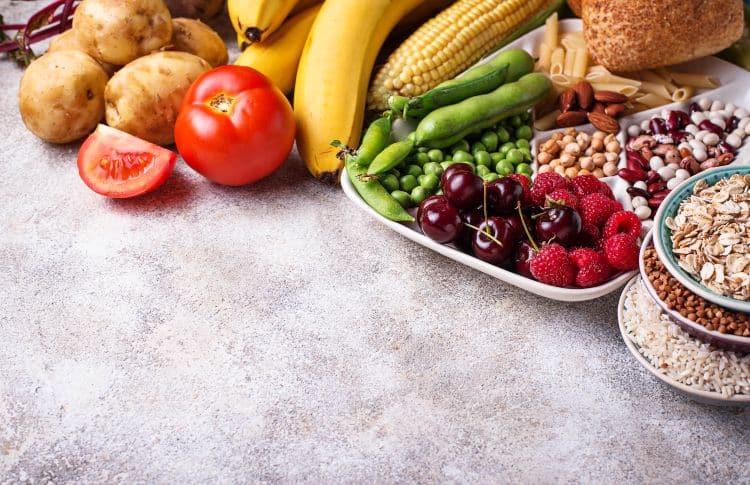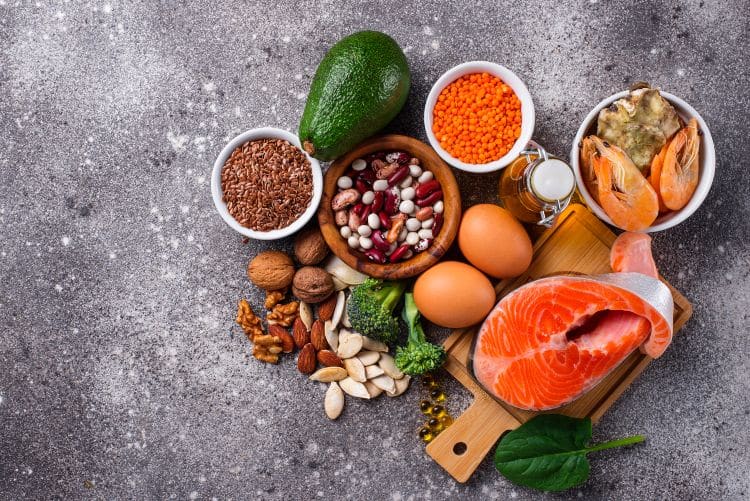Attention deficit hyperactivity disorder (ADHD) is a neurodevelopmental disorder characterized by inattention, hyperactivity, and impulsiveness. It’s one of the most common disorders among children and also affects many adults.
While there is no definitive ADHD diet, many people suffering from ADHD have discovered that certain foods and nutritional protocols can help alleviate symptoms.
For people with ADHD who are looking for ways to improve their symptoms through diet instead of (or in addition to) behavioral therapy and medication, this essay provides a wealth of helpful information.
And for loved ones of people with ADHD who are looking for ways to help their spouse/partner, child, sibling, or friend manage their symptoms more effectively, the nutritional tips and strategies provided here will be a valuable resource.
Does Diet Affect ADHD?
What is the relationship between diet and Attention Deficit and Hyperactivity Disorder (ADHD)? Can certain dietary choices help mitigate some of the symptoms of ADHD? Can what a person eats help improve focus and attention, and reduce restlessness and hyperactivity?
There’s no scientific evidence that ADHD is caused by poor eating habits. But dietary changes may—at least for some people—help to alleviate symptoms. There’s a growing body of scientific and anecdotal evidence suggesting that eating better can improve mood stability, enhance mental focus, and increase stamina.
Diet can have powerful effects on energy levels and behavior. And certain eating habits are more supportive than others of brain health. Whatever is good for the brain—and positively affects behavior—is likely to be helpful in managing ADHD.
So, while healthy foods may not be a cure-all, certain changes in diet can make a big difference for some people suffering from ADHD. While there’s no substitute for behavioral therapy and (in some cases) medication, paying attention to nutrition is also an intelligent strategy.
How Nutrition Affects the ADHD Brain
Like other cells in the body, brain cells require the proper combination of nutrients to function optimally. For instance:
* The myelin sheath—which provides a layer of insulation over the brain cell axons—needs the proper nutrients to facilitate the transmission of electrical signals between brain cells.
* Neurotransmitters such as dopamine, serotonin, and norepinephrine depend on dietary nutrients for proper performance.
Because healthy food is brain medicine, proper nutrition can positively affect a person’s feelings, behavior, and cognitive functioning. And conversely, poor dietary choices may exacerbate ADHD symptoms.
What Type of Diet is Best for ADHD?
The Mediterranean diet and the Feingold diet are two specific dietary schemes that have been recommended for people with ADHD. But it’s unnecessary to follow a particular protocol if basic nutritional principles are applied.
For instance, certain foods are known to support brain health. And others are good for keeping a person’s energy and blood sugar levels stable and improving concentration. Such foods may be of benefit to people with ADHD.
Protein-Rich Foods
Protein is essential for the health of the brain. It helps neurons (brain cells) communicate with each other via neurotransmitters made from amino acids.
Including protein in a meal also helps to prevent spikes in blood glucose levels. Since such spikes may increase hyperactivity, protein-rich foods may help reduce this symptom and improve concentration.
Excellent protein-rich foods include:
- Fatty fish
- Turkey and chicken
- Grass-fed beef
- Nuts: almonds, pecans, cashews, walnuts
- Seeds: flax, hemp, pumpkin, chia, sunflower
- Beans: mung, aduki, garbanzo, black
- Lentils
- Dairy products
- Tempeh
- Quinoa
- Eggs
Complex Carbohydrates
Complex carbohydrates provide energy for the body and help stabilize blood sugar levels. These foods also tend to help a person feel full for a longer time, which can reduce the risk of snacking on junk food.
Complex carbohydrates include:
- Fruits
- Vegetables
- Whole grains: brown rice, barley, rye, quinoa, millet, amaranth, buckwheat
- Whole-grain bread and pasta
- Oatmeal
- Beans and lentils
When possible, purchase locally grown (e.g., at a framer’s market) and organic produce. And experiment with various fruits, veggies, and whole grains.
Healthy Fats & Oils
The human brain is 60% fat, and fatty acids are essential for the brain’s functioning. So, good fats and oils are necessary to a person’s health, even more so for someone with ADHD!
Healthy fats and oils include:
- Extra virgin olive oil
- Cold-pressed coconut oil
- Butter and ghee
- Grapeseed oil
- Walnut oil
- Sesame oil
- Avocado oil
Omega-3 Fatty Acids
Within the realm of healthy fats, one type that is especially important to brain health is omega-3 fatty acids—which help to optimize brain health and prevent heart disease.
People with ADHD often have lower levels of omega-3 fatty acids than do people who don’t have ADHD. And lower levels of omega-3s have been associated with increased learning and behavioral problems. Increasing one’s intake of omega-3s may improve attention, focus, motivation, and working memory.
The best source of omega-3s are fatty fish, but they are found in other foods, also. Excellent sources of omega-3 fatty acids include:
- Wild-caught Alaskan salmon (always choose wild-caught salmon instead of farmed salmon)
- Atlantic mackerel
- Albacore tuna
- Sardines
- Trout
- Walnuts
- Chia seeds
- Hemp seeds
- Flax-seed oil
- Avocados
Foods Rich in Vitamins & Minerals
People with ADHD should aim to consume foods that contain a wide range of vitamins and minerals, including Vitamin C, Vitamin B-6, iron, and zinc.
Some excellent nutrient-dense foods to include in one’s diet are:
- Leafy greens such as spinach, kale, collard greens, and arugula
- Cruciferous veggies such as broccoli, cauliflower, cabbage, and Brussels sprouts
- Blueberries, raspberries, blackberries, and strawberries
- Red, yellow, green, and orange bell peppers
- Seeds: pumpkin, sunflower, chia, and flax
- Carrots and parsnips
- Sweet potatoes
- Beets
- Garlic
- Grass-fed beef and liver
- Salmon and other fatty fish
- Bone broth
- Free-range eggs
- Wild rice
- Lentils
- Avocado
- Plain yogurt
Two excellent supplements to consider for treating ADHD symptoms are:
- Capra mineral whey—for minerals in a whole food matrix.
- Camu-camu powder—for vitamin C in a whole food matrix.
Probiotics
Numerous studies show that probiotic supplementation can positively affect the course of neurodevelopmental disorders, including ADHD.
Probiotic foods include:
- Yogurt
- Kefir
- Tempeh
- Miso
- Kimchi
- Kombucha
- Sauerkraut
Be sure to look for the “live active cultures” label on probiotic foods.
What foods can make ADHD worse?
Certain foods and additives are best avoided or dramatically reduced in the diet of those struggling with ADHD.
Avoid: Refined Sugars & Artificial Sweeteners
It’s best to reduce or eliminate refined white sugar from one’s diet. Along with potentially improving ADHD symptoms, reducing the intake of refined sugar can also reduce the risk of diabetes, obesity, and tooth decay.
And it’s best to completely avoid artificial sweeteners such as Aspartame (NutraSweet and Equal), Sucralose (Splenda), Acesulfame K (Sunett and Sweet One), and Saccharin (Sweet’N Low and Necta Sweet) which can have highly toxic effects on the body.
Replace refined sugar with healthy sweeteners such as raw organic honey, pure maple syrup, molasses, date syrup, coconut sugar, and stevia.
Avoid: Simple Carbohydrates
White sugar is a simple—aka refined—carbohydrate. Like sugar, other simple carbohydrates can contribute to rapid changes in blood sugar levels, so it’s best to consume them only in moderation or not at all.
Toward this end, it’s best to reduce intake of:
- Candy
- Corn syrup
- Products made from white flour
- Crackers and cakes
- White bread
- White rice
- White pasta
- Sports drinks
- Chips
- Sodas
Avoid: Trans-Fats
Trans-fats—aka “bad fats”—should be eliminated, as much as possible, from the diet of someone who has ADHD.
So, best to avoid the following:
- Margarine
- Vegetable shortening
- Nondairy coffee creamers
- Fried fast foods include fried chicken, battered fish, doughnuts, French fries, and mozzarella sticks.
- Commercial baked goods include muffins, cakes, cookies, and pies.
- Refrigerated dough, such as biscuits and rolls.
- Highly refined, heavily processed vegetable oils such as corn, canola, soybean, and safflower oil.
Reduce: Caffeine
While small amounts of caffeine may help alleviate some ADHD symptoms in children, the side effects generally outweigh any potential benefit. Most experts recommend that people either reduce their caffeine intake or avoid it altogether. For people who take medication for ADHD, caffeine can worsen some side effects.
So, best to reduce or avoid coffee, cola, black tea, and caffeinated energy drinks. Instead, enjoy some decaffeinated chai, herbal tea, or a cup of matcha (whose L-theanine balances out the small amount of caffeine).
Avoid: Additives & Preservatives
Some people with ADHD can benefit from eliminating artificial additives from their diets, including:
- Artificial food coloring
- Artificial flavors (e.g., MSG)
- Preservatives (e.g., nitrites and sodium benzoate)
- Artificial sweeteners
A majority of prepackaged and processed products contain artificial coloring, flavors, and/or preservatives. For instance:
- Breakfast cereals
- Candies
- Cookies
- Soft drinks
- Fruit punch
- Children’s vitamins
Avoid the inner aisles of the supermarket, and shop primarily along its perimeter in the produce, dairy, and meat departments.
Avoid: Allergens
Allergic reactions to things like gluten, wheat, soy, milk, eggs, or peanuts can exacerbate the symptoms of ADHD. So, it’s wise to get an allergy test to determine which food items are best avoided.
Tips for Shifting to an ADHD-Friendly Diet
Additional tips for creating a diet that can help alleviate ADHD symptoms:
* Eat balanced meals. Include a mix of veggies, protein, whole grains, and healthy fats in most meals.
* Enjoy the rainbow! As a rule of thumb, it’s a good idea to have two-thirds of the lunch or dinner plate filled with a rainbow of fresh vegetables and fruits: red, yellow, green, orange, and purple.
* Keep healthy snacks on hand. Fresh or dried fruits, nuts, seeds, and chopped vegetables are great options.
* Eat meals at regular times. And try not to skip meals, which may lead to blood sugar crashes and junk food consumption.
* Get in the habit of checking labels. Read ingredient labels, and avoid foods that contain artificial flavors, colors, preservatives, and/or lots of refined sugar.
* Consider a multivitamin supplement. Consult with a doctor about this possibility, particularly for people who are picky eaters.
In general, the best diet for people with ADHD is the diet that doctors recommend for most other people—which features an abundance of fruits, vegetables, whole grains, healthy fats, and lean protein.
Help Is Available
D’Amore Mental Health is an inpatient mental health facility that provides evidence-based treatment for various mental health disorders, including adult ADHD. With an impressive three-to-one staff-to-patient ratio, our qualified team of healthcare professionals provides individualized care twenty-four hours a day, seven days a week.
To help determine whether you or a loved one may be suffering from ADHD, take our adult ADHD self-test.
Questions or comments? Please feel free to contact us for additional information.








































